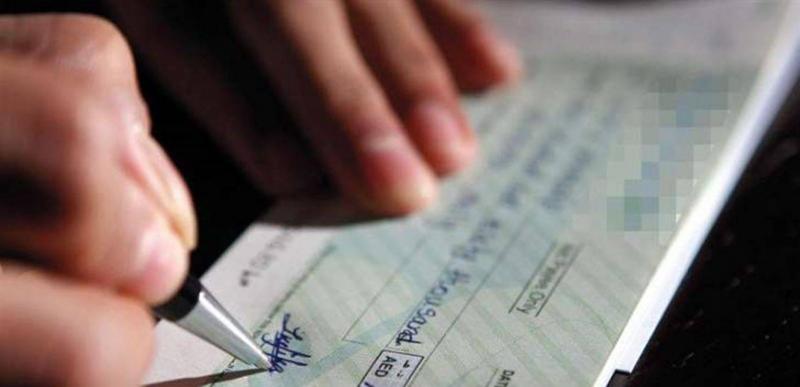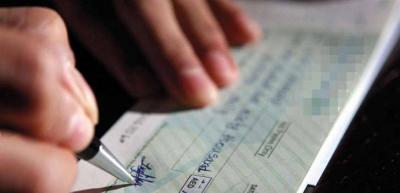Figures from the Association of Banks indicate that the value of checks traded in foreign currencies between banks, through the clearing of the Central Bank of Lebanon, did not exceed $5.88 billion in the first half of this year, up until June. Thus, the value of foreign currency checks traded among banks has dropped by 48.34% in the first half of this year compared to the same period last year, when it reached approximately $11.38 billion. It is noteworthy that the volume of foreign currency checks declined by 73% compared to similar periods in the years before the banking collapse, when the check values exceeded $22 billion in the first half of the year.
### Check Activity: Lowest Level Since the Crisis
Certainly, this rapid decrease in check activity is not linked to the deposit crisis that began in October 2019, as the check movement during the same period last year (first half of the year) was double that of this year, despite the fact that the country had entered the deposit crisis about a year and two months before the last year began. It is also apparent that the check activity during the same period in 2020 did not differ significantly from its activity in 2019, despite the onset of the deposit crisis in the last two months of 2019, which suggests that the deposit crisis did not hinder check activity. Moreover, no previous year experienced a decline in check movement similar to that of this year.
On the contrary, throughout the past two years, a significant percentage of depositors continued to use rolled checks to meet their obligations, with merchants relying on valuing rolled checks at a certain ratio of cash dollars. During this period, some companies were able to use “local dollars” through checks to pay salaries or settle some dues, which were later withdrawn according to the exchange rate set in Circular No. 151 (which was raised from 3,900 to 8,000 Lebanese pounds per dollar in the last month of last year). For this specific reason, the movement of bank checks had not declined to the level recorded in the first half of this year at any previous stage. It is important to note that the use of rolled checks in payments allowed deposit holders to benefit from their banking liquidity, while some beneficiaries of the checks were able to settle some obligations owed to banks through the “local dollars” they received.
### New Banking Procedures
In summary, to understand the unprecedented decline in the movement of foreign currency checks during the first half of this year, it is sufficient to refer to the series of procedures that Lebanese banks have implemented since the beginning of this year, simultaneously regarding the mechanisms for depositing checks into bank accounts. All these measures aimed to restrict the trading of checks and prevent their deposit in foreign currency accounts, except in cases of extreme necessity or for a very limited number of commercial companies. Even when approving the deposit of checks in the account, banks insisted on depriving the depositor of the cash withdrawal ceiling in Lebanese pounds from the rolled accounts (i.e., withdrawing under Circular 151, at the rate of 8,000 pounds per dollar).
Thus, banks unilaterally decided to impose "capital control" on the domestic movement of banking liquidity, after having imposed it since October 2019 on cash dollar withdrawals and transfers abroad, from local dollars. These steps were complemented by additional measures gradually taken by some banks, which included halting the acceptance of incoming internal transfers (i.e., transfers received from other local banks within Lebanon).
It is worth noting that banks had made similar decisions last year to tighten the movement of checks in clients' accounts, but these decisions were not as stringent as the measures imposed since the beginning of this year, which reached the point of halting check deposit transactions for the vast majority of clients.
### Preempting the Bank Restructuring Law
What banks aim to achieve with all these restrictions is to reduce the value of their obligations to depositors by any means possible, even if it involves stopping the acceptance of "new rolled checks" that could result from depositing checks with them. The ultimate goal is to preempt the stipulations of the emergency law for the restructuring of banks and to reduce the amount of liquidity that each bank is supposed to guarantee and repay to each depositor up to a certain amount (which will range between $100,000 and $150,000 according to the recovery plan). By reducing the size of each deposit through refusals to accept checks, each bank will be able to decrease the liquidity required to guarantee its deposits, according to the ceiling that will be determined in the restructuring law.
It is important to recognize that the evaluation of each bank's ability to remain in the market or to enforce its classification or merging will depend specifically on its capacity to guarantee deposits according to the final amount that will be set in the restructuring law. Simply put, banks have preempted the financial recovery plan cunningly since the beginning of the year, while this plan will consider the balances of bank accounts as of March 31, to ensure the deposits within them, meaning that the banking procedures have preempted this date by about three months. As is customary, the Central Bank of Lebanon did not intervene regarding any of these unjust banking procedures against customers, despite the fact that the refusal to accept banking checks without justification constitutes a blatant violation of the Central Bank's circulars.




